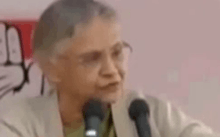Sheila Bhatia
Sheila Bhatia was an Indian poet, playwright,[1] theatre personality[2][3] and the founder of the Delhi Art Theatre, a forum based in Delhi for the promotion of Indian art forms.[4] Punjabi opera, an Indian form of dance drama incorporating operatic movements, is reported to have been originated by Sheila Bhatia.[5][6][7][8] She was honoured by the Government of India in 1971 with Padma Shri, the fourth highest Indian civilian award.[9] A decade later, she received the Sangeet Natak Akademi Award for theatre direction in 1982[10] followed by Kalidas Samman in 1997.[11]
Sheila Bhatia | |
|---|---|
 | |
| Born | 1 March 1916 Sialkot, British India |
| Died | 17 February 2008 India |
| Occupation | Poet, playwright, theatre personality |
| Known for | Punjabi opera |
| Awards | Padma Shri Sangeet Natak Akademi Award Punjabi Academy Param Sahit Sarkar Sanman Delhi Administration Award Ghalib Award Punjabi Arts Council Award DA Best Director Award Urdu Academy Award Kalidas Samman Param Sahit Sarkar Sanman |
Biography
Sheila Bhatia was born on 1 March 1916[5] in Sialkot in the British India, in the present day Pakistan.[11] After securing a BA degree, she graduated in education (BT) and started working as a teacher of mathematics in Lahore, involving herself with Indian freedom struggle.[4] Later she moved to Delhi where she founded Delhi Art Theatre.[5][12] She also worked with the National School of Drama as the head of the acting department.[11]
Bhatia's debut production was Call of the Valley, a musical.[4][5] That was followed by over 60 productions,[1] such as Heer Ranjha (1957), Dard Aayega Dabe Paon (1979), Sulgada Darya (1982), Omar Khayyam (1990), Naseeb (1997), Chann Badla Da, Loha Kutt,[13] Ghalib Kaun tha and Nadir Shah in Punabi and Qissa yeh aurat ka (1972), Hawa se hippy tak (1972), and Yeh ishq nahin asan (1980) in Urdu.[5][11][12] A follower of Faiz Ahmed Faiz,[14][15] Bhatia also has 10 publications to her credit including the poetry anthology, Parlo Da Jhakkarh (1950).[11]
Awards
The Government of India awarded her the civilian honour of Padma Shri in 1971.[9] She received the Sangeet Natak Akademi Award for best direction in 1982.[10] The next year, she was awarded the Ghalib Award (1983) followed by Punjabi Arts Council award.[11] She received the best director award from the Delhi Administration in 1986 and the Kalidas Samman in 1997.[11] She was also a recipient of Urdu Academy Award[11] and the Param Sahit Sarkar Sanman by the Punjabi Academy (2000).[16]
Death
Sheila Bhatia died on 17 February 2008 at the age of 91.[5]
See also
References
- Ananda Lal (ed.) (2004). The Oxford Companion to Indian Theatre. Oxford University Press. ISBN 9780195644463.CS1 maint: extra text: authors list (link)
- "Aesthetics of Indian Feminist Theatre". Rup Katha. 2015. Retrieved 30 May 2015.
- Susie J. Tharu, Ke Lalita (1993). Women Writing in India: The twentieth century. Feminist Press. p. 688. ISBN 9781558610293.
- "Rich tributes paid to Sheila Bhatia". The Hindu. 23 February 2008. Retrieved 30 May 2015.
- "Shiela Bhatia – A legend of Indian Operas passes away". Stage Buzz. 2008. Retrieved 30 May 2015.
- Stanley Hochman (1984). McGraw-Hill Encyclopedia of World Drama. McGraw-Hill. p. 2900. ISBN 9780070791695.
- Colin Chambers (2006). Continuum Companion to Twentieth Century Theatre. A&C Black. p. 896. ISBN 9781847140012.
- Gurcharan Singh (1990). Studies in Punjab History & Culture. Enkay Publishers. p. 281. ISBN 9788185148298.
- "Padma Shri" (PDF). Padma Shri. 2015. Retrieved 11 November 2014.
- "Sangeet Natak Akademi Award". Sangeet Natak Akademi. 2015. Archived from the original on 30 May 2015. Retrieved 30 May 2015.
- Kartik Chandra Dutt (1999). Who's who of Indian Writers, 1999: A-M. Sahitya Akademi. p. 1490. ISBN 9788126008735.
- Manoj Sharma (16 November 2011). "Capital's cultural affair began in 50s". Hindustan Times. Retrieved 30 May 2015.
- Habib Tanvir (2014). Memoirs. Penguin. p. 400. ISBN 9789351182023.
- "India, whose love could have killed him". Dawn. 13 February 2011. Retrieved 30 May 2015.
- Amaresh Datta (1988). Encyclopaedia of Indian Literature, Volume 2. Sahitya Akademi. p. 987. ISBN 9788126011940.
- "Academy award for Harkishan Singh". The Tribune. 18 May 2000. Retrieved 30 May 2015.
Further reading
- Susie J. Tharu, Ke Lalita (1993). Women Writing in India: The twentieth century. Feminist Press. p. 688. ISBN 9781558610293.
- Ananda Lal (ed.) (2004). The Oxford Companion to Indian Theatre. Oxford University Press. ISBN 9780195644463.CS1 maint: extra text: authors list (link)